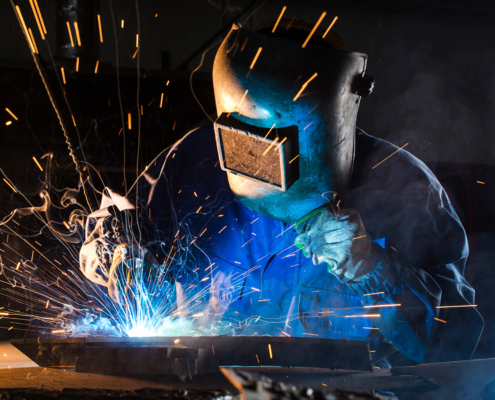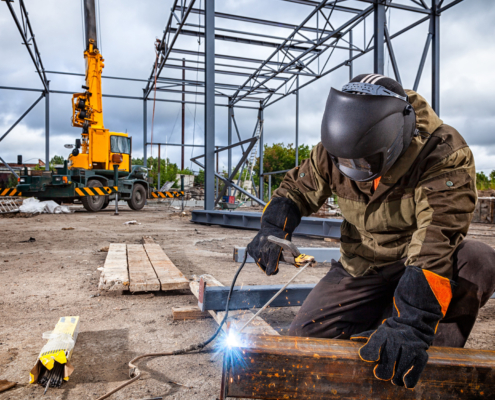Conventional Types of Welding in Building Construction
Welders use various processes in building construction, and each process serves a particular need and requires specific equipment. Here are the four main types of construction site welding:
Metal Inert Gas (MIG) Welding
MIG welding is a technique that uses electric current to melt and fuse metals. This process forms an electric arc between a consumable welding wire and metal; a contact tip then transfers an electric current that guides the wire. MIG welding also requires a shielding gas that’s fed through a welding gun. Shielding gas plays an important role because they protect the weld from contaminants. Welders prefer MIG welding because it’s clean and offers long-pass capability.
Tungsten Inert Gas (TIG) Welding
TIG welding uses a non-consumable tungsten electrode to generate an electric current that melts and fuses metal. Technicians use TIG welding to combine thin sections of stainless steel and metals. While difficult to master, it’s a versatile technique that offers welders greater control and produces precise welds.
Stick Welding
Stick welding melts and fuses metals using an electrical current created with a consumable flux-coated electrode. This method is used in construction to weld joins between base metals. Stick welding is versatile and efficiently welds iron, steel, aluminum, nickel, and copper alloys.
Recent Advancements in Construction Site Welding Technology
Just because welding has been around for a long time doesn’t mean there isn’t room for innovation. Technicians are always looking for new and efficient ways to join metals. Recent advancements in welding technologies include:
Plasma Welding
Plasma cutting is a method that uses a jet of hot ionized plasma to cut through electrically conductive metals. The pilot arc generated from plasma cutting approaches 40,000 degrees Fahrenheit and results in cleaner cuts than other techniques. Some of the metals that are ideal for plasma welding include:
- Aluminum
- Mild steel
- Brass copper
Robotic Automation Welding
A 2021 survey found that four out of five construction companies plan to introduce robotic welding into their operation in the next 10 years. Robotic automation welding machines can be programmed to perform simple tasks on construction sites, freeing up your workers for more complex jobs. Other benefits of automation include:
Increased Productivity
Robots can work 24-hour shifts at consistent speeds, increasing productivity by completing projects more quickly.
Improved Safety
Welding is dangerous, and proper safety measures need to be adopted to protect workers. Robotic welding machines don’t need to be protected from toxic fumes and bright flashes, creating a safer working environment for your employees.
Limited Waste
Robotic welding machines provide precise welding measurements, creating fewer errors and generating less waste.
Reduced Costs
While robotic automation welding machines have high start-up costs, they provide long-term cost savings by increasing productivity and limiting mistakes.
Do you have the industrial gases you need for a proper weld?
We’re Missouri’s largest independent supplier of industrial gases because we offer high-quality gases and an innovative delivery system. Contact us today to learn more.
CK Supply: Supplying Portable Welding Equipment and More for the Construction Industry Since 1948
CK Supply has provided welding equipment for various industries for over 70 years. We know how important quality welding equipment is to the construction industry and maintain a selection of major brand welding equipment, like:
We also keep a stocked selection of protective gear designed to maximize safety at your facility, including goggles and gloves. Our commitment to our clients extends beyond supplying equipment; we offer industry-leading services including:
Welding Rentals
We have a convenient welding equipment rental program that allows our clients to receive up-to-date welders from the industry’s top producers. Whether you need equipment for a few days or a few months, our stock of rental equipment ensures that you have the equipment you need.
Welding Repair
Exposure to dust and dirt can cause equipment breakdown. When this happens, our team of certified repair technicians is available to repair your portable welding equipment. We can fix most welding machine models and provide onsite repairs.
Welding Training
Welding technology is constantly evolving, and keeping up-to-date on industry trends allows you to provide the best service. We offer education courses at our Hil Bax Technical Center that introduces participants to the latest welding techniques. Our classes include introductions to robotics and automation welding.
Contact CK Supply today to learn more about our services and high-quality welding equipment.





